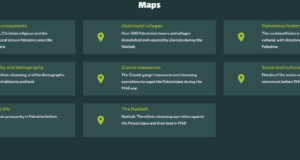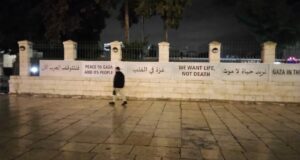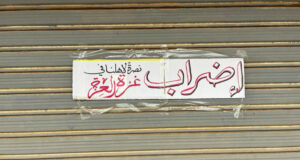By Adam Stumacher
The town of Beit Fureek lies a mere seven kilometers from the West Bank city of Nablus, but under military curfew they might just as well be separated by an ocean. According to Atef Hanini, the town’s mayor, not a single resident of this town has been to Nablus for two months now. As a farming community, Beit Fureek is dependent on access to the nearby city in order to sell produce, and most of the town’s working population is employed there (though of course were they by some miracle able to get to Nablus, they would find all shops and businesses closed due to 56 consecutive days of military curfew). However, the real crisis in Beit Fureek is not unemployment, but water.
Every ounce of water for this town of 12,000 residents must be brought by truck from Nablus. The Israeli authorities have refused to tap into the water pipeline that passes less than five hundred meters from city limits. But perhaps more significantly, there is a spring close enough to this town that the residents can hear its gurgling (when their ears are not filled with the sound of M16 rounds). This spring has enough water that it could meet the needs of all the town’s residents, plus the residents of the nearby community of Beit Dajan, which faces the same water shortage. But one hundred percent of the water from this spring is diverted to illegal Israeli settlements in the Jordan Valley. So the water tanker truck has become the tenuous lifeline for this whole community.
The town owns a total of five water tankers. The trouble is, these trucks are sporadically held at the army checkpoint on the Nablus access road. In theory, the trucks have permission to pass back and forth to Nablus between the hours of 10 AM and 2 PM. But soldiers often detain the trucks so long at the checkpoint that even completing one run per day can be a challenge. Sometimes, when unable to pass through the checkpoint, desperate truck drivers fill up from non-sanitary water sources, which has contributed to a outbreak of amoebic dysentery in the town (which has almost no access to medical care, again due to the curfew).
Beit Fureek has been averaging eight tankers of water per day since April, while Hanini assesses the community’s basic survival need at twenty twenty six tankers per day. But when I visited the town today, extremely strict enforcement at the checkpoint for the past couple of days meant that only one water truck had arrived in the town over the last 48 hours. Hanini asserted that this was a fairly typical pattern, and the military would most likely ease up enforcement at the checkpoint in the next day or two.
Some town residents have been without water in their homes for over 40 days now. The only way this community survives is by sharing whatever limited resources they have with their neighbors. Lack of water has severely damaged the town’s agricultural output. Farmers have stopped watering their crops, and most of the town’s livestock has been slaughtered because there is insufficient water to keep both animals and humans alive. In short, the people of Beit Fureek are being murdered, very slowly and systematically, by the conditions under Israeli occupation.
But the killings are not always so slow. I spent the night in the home of Munir, a extremely eloquent and erudite engineer in his late twenties (unable to travel to his work in Nablus since April because of road closures). Over thick cups of coffee under his back yard grape arbor, he told me the story of his late uncle, Mohammed Zamut:
This event took place last October, during the town’s annual olive harvest. This is an extremely dangerous time of year in Beit Fureek, as the town’s olive groves are close to the Israeli settlement of It Mar (the grove has been there for many generations, but the settlement lands were siezed, in violation of international law, less than twenty years ago). Every year for the past three years, at least one villager has been fatally shot by settlers while harvesting olives, but no settler has served a single day of jail time for these crimes.
Last year, the seventy-year-old Zamut was helping with the harvest when he turned up missing at the end of the day. His family searched for him all night, and Israeli security forces were alerted but refused to assist in the search. Zamut’s body was finally found near the olive grove the next morning. This seventy year old man had been shot, but this was not what killed him. His arms were cut off below the elbows and his legs severed below the knees, but these attrocities did not kill him either. Nor did his left eye, which was found pulled out of his socket. According to a coroner’s report, his death occurred when his skull was crushed by a large rock. Israeli authorities eventually arrested and tried a settler by the name of Gurham for this crime, but Gurham pleaded temporary insanity and was acquitted, never serving jail time.
Every person I have met here in Palestine has a story to tell, and every story leaves me unable to breathe. I want to curl into fetal position and cry, or thrash on the ground and shout at the top of my lungs, but I cannot. Instead I offer my condolences to Munir and sip my coffee, silently renewing my pledge to fight this injustice with every ounce of my energy.
Dr. Martin Luther King once said that we should not rest until justice flows like water. But for the people of Beit Fureek, the tankers are still detained at the closest checkpoint.
 International Solidarity Movement Nonviolence. Justice. Freedom.
International Solidarity Movement Nonviolence. Justice. Freedom.


